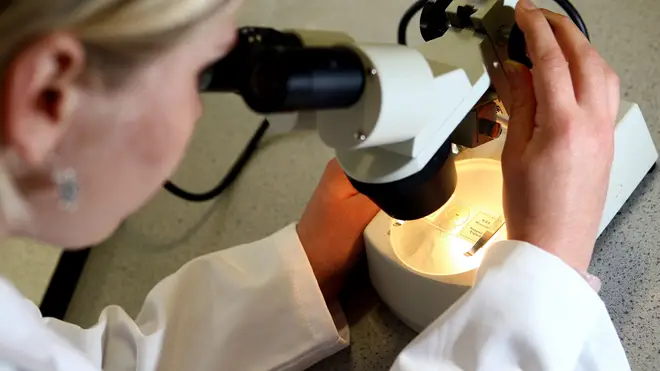
Shelagh Fogarty 1pm - 4pm
31 October 2023, 23:34

Researchers have developed an algorithm that predicts how aggressive a tumour is likely to be more accurately than a biopsy.
Artificial intelligence (AI) could help diagnose and treat rare cancers faster than a biopsy, a study has suggested.
Researchers now hope their algorithm could be applied to other types of the disease, potentially benefitting thousands of people every year.
A team from the Royal Marsden NHS Foundation Trust and the Institute of Cancer Research in London explored how AI could be used to grade the aggressiveness of some sarcomas.
Sarcoma is a type of cancer that develops in the body’s connective tissues, such as fat, muscle and nerves, and according to Cancer Research UK there are 4,300 new cases in England each year.
Researchers suggest using AI could help tailor treatment more accurately than a biopsy, and could also help doctors diagnose subtypes of the disease faster.
For the study, the team specifically looked at retroperitoneal sarcoma, which develops at the back of the abdomen and is difficult to diagnose and treat due to its location.
Dr Amani Arthur, registrar at the Royal Marsden NHS Foundation Trust and clinical research fellow at the Institute of Cancer Research, said there is an “urgent need” to improve diagnosis for this type of sarcoma.
“The disease is very rare – clinicians may only see one or two cases in their career – which means diagnosis can be slow,” Dr Arthur said.
“This type of sarcoma is also difficult to treat as it can grow to large sizes and, due to the tumour’s location in the abdomen, involve complex surgery.”
The team used CT scans from 170 Royal Marsden patients with the two most common forms of retroperitoneal sarcoma – leiomyosarcoma and liposarcoma.
Using data from the scans, they created an AI algorithm which was then tested on 89 patients from centres in Europe and the US.
The technology accurately graded how aggressive the tumour was likely to be 82% of the time, while biopsies were accurate in 44% of cases.
AI was also able to differentiate between leiomyosarcoma and liposarcoma in 84% of sarcomas tested, while radiologists were unable to tell the difference in 35% of cases.
For the next phase of the study, the technology will be tested in clinic on patients with potential retroperitoneal sarcomas.
Study lead Christina Messiou, a consultant radiologist at the Royal Marsden and professor in imaging for personalised oncology at the Institute of Cancer Research, said: “We’re incredibly excited by the potential of this state-of-the-art technology, which could lead to patients having better outcomes through faster diagnosis and more effectively personalised treatment.
“As patients with retroperitoneal sarcoma are routinely scanned with CT, we hope this tool will eventually be used globally, ensuring that not just specialist centres – who see sarcoma patients every day – can reliably identify and grade the disease.”
The findings were published in medical journal The Lancet Oncology, with researchers hopeful the technique could eventually be applied to other types of cancer.
Prof Messiou added: “In the future, this approach may help characterise other types of cancer, not just retroperitoneal sarcoma.
“Our novel approach used features specific to this disease, but by refining the algorithm, this technology could one day improve the outcomes of thousands of patients each year.”

Dr Paul Huang, team leader of the molecular and systems oncology team at the Institute of Cancer Research, said: “Sarcomas represent a biologically complex group of cancers – encompassing many distinct types – and telling them apart with the human eye poses a formidable challenge, particularly outside of specialist centres.
“This kind of technology has the potential to transform the lives of people with sarcoma – enabling personalised treatment plans tailored to the specific biology of their cancer. It’s great to see such promising findings.”
The study was funded by the Royal Marsden Cancer Charity, the National Institute for Health and Care Research (NIHR), the Wellcome Trust and the EORTC Soft Tissue and Bone Sarcoma Group.
Sarcoma UK chief executive Richard Davidson said the results “look very promising”.
He added: “We have long called for more research to fully understand how sarcomas develop, spread and how best to diagnose and treat them.
“People are more likely to survive sarcoma if their cancer is diagnosed early – when treatments can be effective and before the sarcoma has spread to other parts of the body.
“One in six people with sarcoma cancer wait more than a year to receive an accurate diagnosis, so any research that helps patients receive better treatment, care, information and support is welcome.”
Health and Social Care Secretary Steve Barclay said: “AI has the potential to revolutionise cancer care by ending invasive procedures and speeding up diagnoses and treatment, which could be the difference between life and death.
“The Government is investing more than £1.2 billion a year into research to unlock the next generation of treatments and diagnostic tools, and it’s fantastic to see this ground-breaking technology being embraced and benefitting NHS patients.”
The findings come after Prime Minister Rishi Sunak announced a £100 million fund to propel research into previously incurable diseases using AI.
He said the technology could help “solve some of the greatest social challenges of our time” including finding “novel dementia treatments or develop vaccines for cancer”.